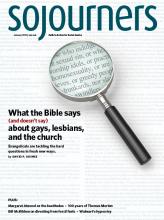IF WE FOLLOWED the church calendar and celebrated Epiphany in January, we wouldn’t have to cram the wise men into the crèche to compete with the shepherds. We could save all the “Star of Bethlehem” songs to brighten the cold days of January. Obviously, the magi needed a few weeks to prepare and then travel “from the East.”
A new bright object in the sky was certainly an “epiphany,” but it was not totally unexpected. These magi were astrologers, the ancient astronomers of their day. To the east of Jerusalem lay Babylon, birthplace of astrology and location of a large Jewish community. The discovery of two astrological books among the Dead Sea scrolls showed that the sign of Aries the Ram in the zodiac represented the reign of Herod the Great in Judea. Since Herod was aging, it is not surprising that Jewish astrologers were watching this royal constellation.
In a television series called Jesus: The Complete Story, astronomer Michael R. Molnar notes an unusual astrological conjunction on the night of April 17, in 6 B.C.E., the year Jesus was most likely born. At that time, both Saturn and the sun were in the constellation Aries, and then the moon eclipsed to reveal Jupiter, king of the planets, also in Aries. Jupiter shone into the dawn, another auspicious sign of royalty. It was confirmation enough to send these astrologers on their way.
Perhaps if we celebrated Epiphany after Christmas, we’d have more time to learn about this epiphany and its remarkable interpretation.
Read the Full Article

